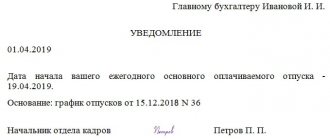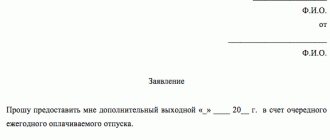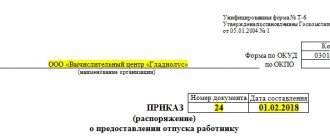Home / Labor Law / Vacation
Back
Published: 06/13/2016
Reading time: 6 min
0
3227
According to labor legislation, the right to receive leave arises for a citizen who has worked for his employer for at least six months . However, the fact that this right arises does not mean that leave will be granted to the employee immediately after the required length of service has been completed.
As a general rule, vacations are provided to employees in accordance with the vacation schedule approved by the organization; deviations from it are allowed only if there are sufficiently compelling reasons for this.
If an employee needs to take leave unscheduled or before the right to do so arises, he can apply to management with a request to provide leave “in advance,” that is, unscheduled.
- What kind of vacation can I take in advance?
- Who is entitled to advance leave by law?
- Documenting
- Payment
- If an employee who has used vacation in advance resigns
The concept of “vacation in advance” and its legislative framework
There is no official term “vacation in advance” in Russian legislation. Annual paid leave, guaranteed to each employee by the Labor Code (Article 122), is earned for 1 working year. It is counted not from the beginning of January, but from the date of registration of the employment contract, that is, it is individual for each employed person.
An employee can go on this leave after completing six months of work experience (the provisions of Article 122 of the Labor Code of the Russian Federation) or earlier, in agreement with the employer. It is not difficult to calculate that during this time, at best, only half of the officially established vacation duration will be worked. It turns out that the second half, if the vacation is not divided into parts, the employee receives in advance.
If the length of service is less than 6 months, then the advance payment of vacation days provided is even longer.
In the second and subsequent years of work, vacation is given according to the schedule at any time; length of service no longer matters, so vacation is often assigned in advance.
FOR YOUR INFORMATION! International Labor Organization Convention No. 132 on Holidays with Paid, which the Russian Federation ratified in 2010, states that an employee can receive leave from any day of his employment for a duration proportional to the time worked. However, many employers give preference to the norms of the Labor Code of the Russian Federation, which are legally “above” the conventional ones. The Labor Code does not deprive the employer of the right to allow early leave, and, regardless of the time worked, it allows you to receive it in full.
Thus, it is possible to define leave provided in advance as annual paid time for legal absence from the workplace, received before the moment of its actual working out.
Design features
In order to properly document an employee’s absence, it is necessary to follow the general procedure, with the involvement of an accountant and the HR department:
- The employee submits an application for leave in advance according to the model established at the enterprise. The application indicates the duration of paid leave for the future period, and the employee, at his own discretion, supplements the text with information about the circumstances that forced him to ask for days in advance.
- Management puts an approval visa on the document and sends the paper to the personnel department to issue an internal order.
- The employee reads the order and signs the notification.
- The accountant, based on the instructions provided, calculates vacation pay and organizes its payment before the start of the term.
Even if a person has verbally agreed in advance on the right to a vacation on credit, one should wait until the company pays the money and provides an order for review. Otherwise, the verbal agreement threatens to result in absenteeism and subsequent dismissal.
Differences between advance leave and timely leave
The conditions under which such a vacation becomes a reality differ from the usual guarantee of annual vacation in several important nuances:
- the manager has the right to refuse permission for such leave, since providing rest in advance is not his responsibility;
- vacation granted in advance cannot be replaced with monetary compensation, because these funds have not yet been earned;
- like regular leave, such leave can be divided into parts, one of which cannot be less than 2 weeks.
Nuances of provision
Conditions for providing such a period:
- it is important to determine what period is included in the length of service;
- provision of days in advance is possible only by agreement with the management of the organization (with the exception of categories of employees for whom such an opportunity is provided in accordance with the legislation of the Russian Federation);
- the duration should not be less than two weeks;
- cannot be replaced by monetary compensation.
In other cases, vacation days are provided in accordance with the approved schedule.
The employee formalizes his desire to receive this leave with an application. The will of the employer is reflected in the resolution on this document. A sample application is usually available at the enterprise and is adapted to each specific situation.
Payments in case of dismissal of an employee
If such an agreement has been concluded with the employee, he must work the required number of days. Otherwise, the employer will suffer losses. But, according to the law, the management of the organization does not have the right to demand compensation for the time off if the contract with the person is terminated for the following reasons (Part 2 of Article 137 of the Labor Code of the Russian Federation):
- by agreement of the parties;
- upon expiration of the contract;
- when transferred to another organization;
- due to a reduction in staff and number of employees at the enterprise;
- refusal to continue activities due to changes in working conditions;
- temporary incapacity for work lasting more than four months, with the exception of maternity leave;
- due to training;
- in connection with retirement;
- for other extenuating circumstances.
If the contract is terminated for other reasons, for example, due to voluntary dismissal, the employer has the right to demand compensation for days off.
At the same time, the employer should remember that he must decide to withhold funds for unearned vacation no later than one month from the date established for the return of such payments.
Important! Article 138 of the Labor Code of the Russian Federation establishes a limit for the deduction of such compensation. Its amount should not exceed one fifth of the salary, and in some cases no more than 50 percent of the salary due to the employee. If funds were paid in a larger amount, their return is possible only by agreement with the employee.
Early prenatal leave for pregnant women
Providing such a measure to a pregnant woman is a fairly common practice.
In this case, the date of registration for the position does not matter; the employee is entitled to early vacation days if she has a certificate from the antenatal clinic and then goes on maternity leave. This rule is regulated by Article 260 of the Labor Code of the Russian Federation. In this case, the employee writes a statement in the following format:
Note! The management of the enterprise does not have the right to refuse such a request from a pregnant employee, since this right is guaranteed by the Labor Code of the Russian Federation. She also needs to pay all due funds.
Features of registration of leave for military personnel
Military personnel, like ordinary citizens, have the right to a vacation period. At the same time, special regulations are applied in matters of regulating labor relations. A serviceman has the right to use up to 10 days at any time, with an increase in the time spent traveling to the place of vacation and back, if he has valid reasons and in other cases established by law. At the same time, his expression of will is drawn up in the form of a report, not a statement.
The commander considers the report in accordance with the procedure established by law. If the request is approved, an appropriate order is issued. The serviceman needs to fill out documents for travel, and also check in the log, indicating his place of stay. These rules are regulated by Decrees of the President of the Russian Federation No. 1237 and No. 1495.
Note! Upon arrival, the serviceman is checked in at the local military registration and enlistment office. After returning to the place of service, he must also check in and hand over transport tickets, which will confirm the fact of the trip. It is extremely important for a military personnel to comply with legal requirements. He may be held accountable for violations. Download for viewing and printing:
Decree of the President of the Russian Federation dated September 16, 1999 N 1237 (as amended on December 27, 2017) “Issues of military service”
Decree of the President of the Russian Federation of November 10, 2007 N 1495 (as amended on December 27, 2017) “On approval of general military regulations of the Armed Forces of the Russian Federation”
Registration of advance leave for a pensioner
Working pensioners do not belong to the categories of workers who are entitled to leave at a time convenient for them at their request (Part 4 of Article 123 of the Labor Code of the Russian Federation), therefore pensioners are granted leave on a general basis (subject to the absence of additional benefits).
So, if a pensioner is a participant in the Great Patriotic War, a working pensioner (by age), a disabled pensioner, the employer is obliged to provide, based on the application of such an employee, leave on account of wages (Article 128 of the Labor Code of the Russian Federation), or in other cases provided for by the legislation of the Russian Federation or a collective agreement . Pensioners are also provided with additional leave in the following circumstances:
- if they work in harmful or dangerous conditions;
- with an irregular schedule;
- when carrying out labor activities in the Far North;
- in other conditions within the framework of current legislation.
Submission procedure:
- the pensioner writes an application (in some cases it is necessary to attach additional documents confirming the specific status of the pensioner);
- the immediate supervisor signs a resolution confirming consent;
- the document is transferred to higher authorities;
- after signing, the paper is transferred to the HR department;
- The pensioner is paid all the money due.
The legislation does not impose any special requirements for the application. It is compiled in free form.
What types of holidays cannot be provided in advance?
Not all types of vacations can be taken off earlier than expected. The concept of “vacation in advance” most often refers specifically to annual vacation paid by the employer. But there are some types of leave that must have a documentary basis, so they cannot be granted in advance if the employee does not have an official document confirming this basis. Such holidays include:
- additional;
- administrative;
- training;
- maternity leave (both for childbirth and for caring for the baby).
How is it reflected in the vacation schedule?
Is it possible to provide vacation in advance for the next year? If the vacation is taken in advance, what should be included in the vacation schedule?
If a subordinate has already taken some part of the allotted days for rest in advance in the current year, then this is reflected when drawing up the schedule for the next year.
For example, Beta LLC is drawing up a schedule for 2021, while manager Ivanov, in addition to the twenty-eight days already used, used ten for future vacation.
This is not reflected in any way in the existing schedule, but when drawing up the schedule for next year, instead of the required twenty-eight, Ivanov will have eighteen.
In this case, in column 10 you need to make an entry: received ten days in 2016.
Vacation before or after another vacation
Motherhood is such a special event in a woman’s life that the state tries in every possible way to protect this category of workers. Women planning maternity leave have the right to go on another vacation, even without having worked for the organization for the required 6 months. Mothers can receive the same leave immediately after leaving maternity leave.
In addition to pregnant women and young mothers, the right to go on leave regardless of length of service is granted to:
- their spouses;
- relatives if they took maternity leave instead of their mother;
- employees who have two young children under the age of 14;
- fathers and mothers of disabled children under 18 years of age.
The law provides the same right, but for reasons not related to parenthood:
- part-time employees who are granted leave from their main job (it must coincide with the rest from their combined position);
- wives or husbands of military personnel who have received their leave (for military spouses, the vacation time must also coincide);
- other categories of employees for whom this right is provided for by the organization’s labor or collective agreement.
Who can be given a rest in advance?
The Labor Code does not contain the concept of “vacation in advance,” but Articles 122 and 286 stipulate some cases in which the employer can accommodate and give the employee a rest for the period not yet worked. In particular, Article 122 states that the right to leave arises for a subordinate after 6 months of continuous work with a specific employer.
Expert opinion
Novikov Oleg Tarasovich
Legal consultant with 7 years of experience. Specializes in criminal law. Member of the Bar Association.
In fact, for six months of work, an employee can count on 14 days of rest. But by agreement of the parties, he can be given all 28 days.
In addition, if the employer cooperates, you can receive vacation in advance before the expiration of 6 months. The Labor Code does not exclude this possibility.
Moreover, there are categories of workers who cannot be denied the provision of rest in advance before the expiration of the six-month period:
- workers under 18 years of age;
- pregnant women going on maternity leave or immediately after it;
- who have adopted children under three months of age;
- raising disabled children, etc.
Sample application for advance leave for a pregnant employee
Persons working part-time can also go on vacation for a period not yet worked. According to the rules, such citizens should be granted leave at the same time as at their main place of work. Therefore, even if a part-time worker has not worked the required six months, he has the right to go on vacation during his vacation at his main place.
Other cases of providing advance “vacations” are entirely the responsibility of the employer. The law does not prohibit employers from showing loyalty in this matter, but it is worth remembering the risks in this case.
Vacation before dismissal
Before finally leaving the workplace, the employee has the right to “take off” his allotted vacation days. But what if he plans to quit without earning enough experience for a vacation, but nevertheless wants to go on it?
The key point is the employer's consent. If the management does not mind providing the employee with such an opportunity, nothing prevents him from continuing to be listed as an employee of the company during his vacation, having completed the resignation documents on his last working day. However, it should be remembered that before going on vacation, the issue of monetary compensation for vacation not earned by the resigning person must be resolved: it will have to be paid into the cash register voluntarily, or it will be deducted from the salary during the calculation. The employer will not be able to demand this if the employee quits for one of the following reasons:
- consent of the parties (all issues, including payment, are resolved mutually before the order is issued);
- expiration of the employment contract;
- transfer to another place, to another employer;
- changes in working conditions and refusal to cooperate associated with changes;
- sick leave for more than 4 months (except for maternity leave);
- the employee is sent by the company for training;
- the employee was “laid off”;
- the court reinstated the employee who had previously occupied the position of the dismissed person;
- An employee who has rested in advance retires.
NOTE! If an employee leaves voluntarily or quits due to culpable behavior, compensation for unworked but “committed” vacation can be deducted from his salary without asking consent.
Compensation for payments upon dismissal
When going on an extraordinary vacation at the expense of future time off, the employee receives vacation funds in the amount of his average monthly income. At the same time, if a subordinate is dismissed from his current position during the period of dismissal, then the manager reserves the right to withdraw this amount of money from him, since he has not yet worked it out. Art. speaks about this. 137 Labor Code of the Russian Federation.
However, this provision violates the requirement of Article 138 of the Labor Code, which prohibits management from collecting more than 20% of their vacation pay from employees of an enterprise. Such controversial situations are resolved in two ways:
- The employer is trying to resolve the issue of the return of funds with the subordinate by mutual consent (when choosing this option, the boss cannot put pressure on the citizen, as this may result in administrative punishment for him);
- The company sues the dismissed employee, citing one of the following facts as the basis: vacation pay was accrued erroneously or the actions of the subordinate led to losses for the company. In the listed cases, the court may withhold from the guilty person the amount of funds indicated in the application, which will correspond to the amount of his unearned vacation pay).
It is worth noting that, in addition to compensation in the form of average monthly income, the subordinate is no longer entitled to any payments. But the Labor Code of the Russian Federation also provides for a number of circumstances under which a citizen cannot be deprived of his unearned benefits. These include:
- Liquidation of an enterprise;
- Retrenchment of an employee;
- The company has changed its leader;
- The reason for leave taken in advance is conscription into the army or deteriorating health;
In these situations, the employee will be able to protect his rights in court, since the Labor Code of the Russian Federation will be completely on his side. But management for withdrawing funds under these circumstances will face a fine or even removal from official duties.
Pitfalls of “advance leave” for the employer
It is not surprising that some employers choose not to deviate from their right to provide holiday only on time. There are certain risks in the fact that an employee goes on vacation without earning this opportunity.
The main problem for employers is the possibility of losses due to amounts overpaid for unworked vacation. The manager may face difficulties withholding funds in the event of dismissal of an “over-rested” employee. An employee does not always agree to compensation for vacation pay of his own free will, while it is very difficult to claim this money in court. The law mainly protects the interests of workers, and the regulations provide for a large number of circumstances to which the claim for compensation does not apply, for example:
- the amounts due before dismissal are not enough to cover the debt;
- if the deduction is not made directly upon dismissal, you will have to act through the court or accept the loss of money, the employer has no other legal ways to force the employee;
- the reason for dismissal excludes the possibility of claiming the debt.
Holiday payment calculation
All amounts due are determined on the basis of average daily earnings and actual time worked. The calculation is carried out in the following order. Also see “Calculating vacation in 2021: examples.”
- We determine the average monthly salary using the formula:
Salary average month – average monthly wage; ZP1, ZP2 – salary for each month of work; N – number of months worked.
We calculate the average daily salary:
ZPsr.d. – average daily salary; 29.3 is the average number of days in one month.
We determine the amount of accrued vacation pay (OTPinit.). It will be equal to:
OTPbeg. = ZPsr.d.x D D – duration of rest (days).
We withhold income tax (13%) from accrued vacation pay:
The amount of cash payments will be:
HOLIDAY PAY = OTPinit. – Personal income tax
Solution.
- Let's calculate the average daily salary using the formula:
Let's determine the amount of accrued vacation pay:
The withheld income tax will be equal to:
13,048 x 13% = 1,696 rubles.
Let’s assume that the vacation provided in advance was used by the employee, and later he quit due to:
- A) conscription for military service;
- B) at your own request.
Can the head of IMICOR-Sibir LLC receive monetary compensation? If yes, then in what size?
Solution.
- A) Conscription for military service This is a valid reason for termination of the contract, and therefore does not serve as a basis for collecting compensation (Part 1 of Article 83 of the Labor Code of the Russian Federation). After Khrustalev’s dismissal, there is no need to demand a refund.
- B) Interruption of cooperation at the initiative of the employee This is the basis for the return of vacation pay. The company must withhold from the last salary an amount to pay off the debt for unworked vacation days in the amount of: 13,048 x 20% = 2,609 rubles.
When providing an employee with leave in advance, there is a risk of losing the money paid. Therefore, when an organization goes to court, it is necessary to prepare reliable and convincing evidence of the illegality of the employee’s position, since the court often takes his side.
“Paper” registration of early leave
It is no different from the traditional one, the sequence of actions remains usual:
- An employee writing a statement.
- Positive endorsement of the application by management.
- Issuing an order to grant leave.
- Accrual of “vacation” funds (the only difference is that they have not yet been earned).
ATTENTION! If the employee has been working for more than a year, then the first point will be preceded by scheduling vacations.
Features of calculating the amount of deduction for unworked vacation
When an employment agreement is terminated for reasons that are not included in the list set out above, the employer has the right to demand that the employee return the overpaid funds. This is possible when he decides to resign of his own free will or after a serious disciplinary offense. The employee must notify the employer of his resignation in advance - at least two weeks in advance. It is possible that payment for this period will cover the amount of debt of the worker who received the leave in advance.
Example 1. Financial service economist E. T. Skvortsova, in agreement with her employer, received 28 days of paid leave after working for the company for 10 months. Immediately after returning to work, she announced her decision to quit (wrote a statement) within the time limits prescribed by law. The employee’s salary for the entire period of work was 48 thousand rubles.
To determine the amount of possible deductions, the following calculations should be made:
| Calculation of indicators | Unit change | Result |
| 1. The employee worked for the company for 10.5 months (including two weeks of mandatory work). This means that the number of vacation days earned will be: | days | 24,5 |
| 2. An employee’s average earnings per day for calculating vacation pay: | rub. | 1638,23 |
| 3. Amount of vacation pay: – paid – earned | rub. | |
| 4. Vacation pay arrears: 45 870,44 – 40 136,64 = 5 733,80 | rub. | 5 733,80 |
| 5. Earnings for half a month of work before dismissal: 45,000/2 = 22,500 rub. after tax 22 500 – 22 500 · 0,13 = 19 575,00 | rub. | 19 575,00 |
| 6. The amount that the employer has the right to withhold (20% - maximum): | rub. | 3 915,00 |
The balance is 1,818.80 rubles. (5,733.80 – 3,915.00) the employee can return to the cashier only voluntarily.










